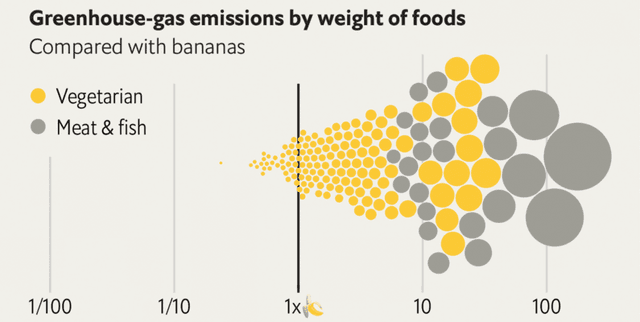Banana Score Environmental Food Data
Food & Beverage Consumption
Tags and Keywords
Trusted By




"No reviews yet"
Free
About
Presents a unique methodology, known as The Economist’s Banana Index, designed to measure the climate impact associated with various food products. This index translates greenhouse-gas emissions into an equivalent measure based on bananas, offering a relatable benchmark for environmental efficiency. The emissions figures are calculated in CO2-equivalents, ensuring that non-CO2 gases are converted based on their 100-year warming potential. The underlying mathematical approach uses the ratio of emissions efficiency to generate the banana score for metrics such as weight, calorie, or protein. This work was initially released in an article titled "A different way to measure the climate impact of food" and is intended for annual updates.
Columns
The dataset contains 17 columns detailing food products and their climate metrics for the year 2022:
- entity: The name of the food item, consisting of 160 unique values.
- year: The recorded year for the data, uniformly 2022.
- emissions_kg: Greenhouse-gas emissions measured per kilogram of food, ranging from 0.21 up to 130.
- emissions_1000kcal: Emissions measured per 1000 kilocalories, with a mean of 4.19.
- emissions_100g_protein: Emissions measured per 100 grams of protein, noting that 1% of values are missing.
- emissions_100g_fat: Emissions measured per 100 grams of fat, with a maximum recorded value of 348.
- land_use_kg: Land usage measured per kilogram of food, with a mean of 13.9.
- land_use_1000kcal: Land usage measured per 1000 kilocalories.
- Land use per 100 grams of protein: Land usage calculated based on protein content (99% valid data).
- Land use per 100 grams of fat: Land usage calculated based on fat content, ranging up to 479.
- Bananas index (kg): The resulting Banana Index score when emissions are measured by weight, with a maximum of 149.
- Bananas index (1000 kcalories): The Banana Index score when emissions are measured by calorie content.
- Bananas index (100g protein): The Banana Index score based on protein content, with a minimum value of 0.
- Chart?: A Boolean column indicating true for all records.
- type: A categorical field ranging from 1 to 3.
- Banana values: Contains primarily missing data (98%), though 'Per KG' is one of the recorded unique values.
- Unnamed: 16: An unnamed column with significant missing values.
Distribution
The data is delivered in a CSV file format named
bananaindex.csv, with a file size of 23.97 kB. The structure consists of 17 columns and includes 160 unique records or entities. The data is structured with a single year of observation (2022) for all records. The dataset is expected to be updated annually.Usage
This data is ideal for comparative analysis of the environmental burden of food. It is specifically useful for researchers and analysts wishing to evaluate food emissions efficiency using a common, normalised metric. Potential applications include modelling the impact of dietary changes, assessing the environmental cost associated with caloric intake, and informing policy regarding food production sustainability.
Coverage
The dataset offers Global coverage. All records pertain to the year 2022. The scope includes 160 distinct food entities, providing metrics related to greenhouse gas emissions and land use efficiency based on weight, calories, and protein content.
License
Attribution 4.0 International (CC BY 4.0)
Who Can Use It
- Economists and Finance Professionals: To evaluate the market and environmental costs within the global food supply chain.
- Sustainability and Climate Researchers: To measure and compare environmental impacts of different consumables.
- Public Health and Dietary Analysts: To inform recommendations regarding climate-friendly food choices.
- Data Journalists: To contextualise discussions about food production and climate change.
Dataset Name Suggestions
- The Economist's Banana Index: Food Emissions 2022
- Global Food Climate Efficiency Metrics
- Banana Score Environmental Food Data
Attributes
Original Data Source: Banana Score Environmental Food Data
Loading...
